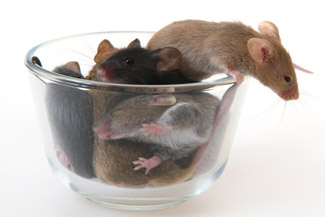Are social ties the keys to cognitive health?
 Having a large social network is one of the factors that may contribute to a healthy brain. But the benefits of maintaining or expanding social connections hasn’t received much research attention. One study has recently done just this by examining these ties between our social network and cognitive health. While it focuses on mice, it may still offer interesting information on one of the possible keys to brain health in humans.
Having a large social network is one of the factors that may contribute to a healthy brain. But the benefits of maintaining or expanding social connections hasn’t received much research attention. One study has recently done just this by examining these ties between our social network and cognitive health. While it focuses on mice, it may still offer interesting information on one of the possible keys to brain health in humans. Few animal studies have looked into the potential neuroprotective effects of a social network. Moreover, the little research that does exist mostly compares socially isolated animals to those living in groups. Until now, in both rodents and humans, scientists haven’t been able to determine whether a large social network could singlehandedly help preserve hippocampal function in elderly individuals. The present study, conducted at Ohio State University (Columbus) tries to show the effect in mice. Elizabeth D. Kirby and her team compared the effects of living as a couple versus living in a community on memory function (which depends on the hippocampus).
In their experiment, the researchers assigned 6 mice to live in pairs (in three "pair” cages) and 14 others to live as a group (in two “group” cages). For three months, certain mice lived as a couple while others cohabitated with a group. The mice began the experiment at 15 months of age and completed it at 18 months. This corresponds to a period of rapid natural memory decline in these animals. The mice were subjected to different tests during these three months.
An object location test consisted of recognizing that a toy (a plastic car for example) had been moved from its "usual" location. In a pre-test phase, each mouse was familiarized with an environment where two or three objects were always placed at the same location and the researchers tested the mouse’s ability to recognize that one of the objects had been moved to a new location. A healthy rodent will generally go toward the moved object. So how did our pair-housed and group-housed mice perform? Mice in the paired condition didn’t show any interest in the object’s new location, while mice in the group condition remembered the toy’s initial location and headed toward the toy that had been moved, while ignoring those that remained at their usual location.
In Barnes maze, another memory test, the mice were placed on a well-lit circular platform with 40 holes, some of which led to escape hatches. Rodents naturally favor dark escape routes because they consider them to be safer. With training, the two groups of mice improved their escape route search strategies, but the scientists noticed a difference in their techniques. After a few days, the paired mice adopted a sequential search strategy: they checked each hole as quickly as possible. Mice in the group condition seemed to have memorized the locations of the escape hatches and headed directly towards them. It is this behavior that the scientists had previously studied in young, healthy mice. This second strategy requires the use of the hippocampus, while the first (sequential) strategy is easier and doesn’t solicit this area of the brain. Speaking about the experiment, E.D. Kirby makes a humorous comparison with human behavior: “It’d be like walking as quickly as possible through each row of a parking lot to look for your car rather than trying to remember where your car actually is and walk to that spot.”
Finally, examining the brain tissue, the scientists noticed that the mice in the group condition showed less inflammation than those in the pair condition. Translation: the brains of the group-housed mice looked “younger” than those of the pair-housed mice. Conclusion: being an old couple isn’t so great for our cognitive health? Of course not! This research suggests that having a bigger social network can have positive effects on our brain.
Source: Bryon M. Smith, Xinyue Yao, Kelly S. Chen, Elizabeth D. Kirby, A Larger Social Network Enhances Novel Object Location Memory and Reduces Hippocampal Microgliosis in Aged Mice, in Frontiers in Aging Neuroscience, May 2018







